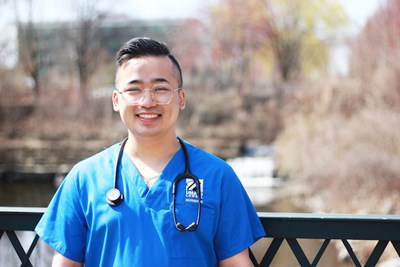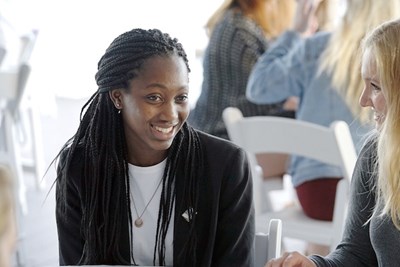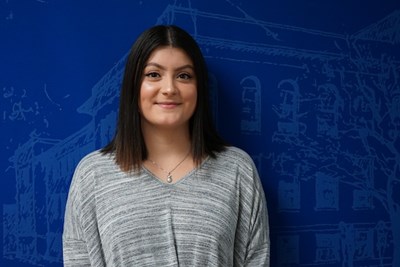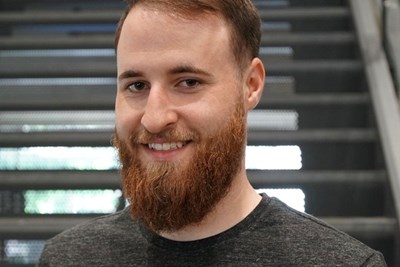At the finish line: graduating UMass Lowell seniors look back — and ahead
Class of 2021 changed, but not defined by pandemic
.jpeg)
For some, the COVID-19 pandemic opened their eyes to the inequities of the health care system. Others said it made them appreciate life’s little moments that they used to take for granted. And for others, the pandemic has actually led to new and innovative ways to think about their careers.
For the Class of 2021, COVID-19 will forever be a part of their college experience.
But it also won’t define the entirety of their time at UMass Lowell.
One week before Commencement, we asked eight graduating seniors to join us for a roundtable discussion on — where else? — Zoom, where we talked about their favorite UML memories, how the pandemic has affected them and what advice they’d give to themselves four years ago, among other topics.
The panel included:
- Kanya Derisme, a business administration major from Boston;
- Daryle LaMonica; a biology major from Peabody, Massachusetts;
- David Long, a biology major from South Paris, Maine;
- Leslie Marrero, an elementary education major from Lawrence, Massachusetts;
- Tiffany Miller, a biomedical engineering major from Hooksett, New Hampshire;
- David Nguyen, a nursing major from Everett, Massachusetts;
- Jillian Roberts, a public health major from Hyannis, Massachusetts; and
- Kaitlin Whiteman, a composition for new media major from Wilmington, Massachusetts.
Here’s what they had to say:
On how they've changed since starting college...
Jillian Roberts: “I’m not the same person I was in any way. I’m a first-generation American and a first-generation college student. I’m one of eight kids, and the fifth person to attempt getting a bachelor’s degree — and the first of my siblings to actually get it. When I came here, I wasn’t strong academically. I didn’t know if I could afford it. I worked 80 hours a week to try and afford my first year. And UMass Lowell has given me so many opportunities. I’ve become an EMT, a CPR instructor, a resident advisor. I’ve had an amazing community that has loved me completely, and I’ve become a much stronger person.”
Kaitlin Whiteman: “I came into college very, very shy and self-conscious. I felt like an impostor as a musician. Over the four years, I don’t know what happened, but I’m significantly more confident in myself, and I just feel more well-rounded as a person.”
Leslie Marrero: “A few years ago, I would have definitely passed on this opportunity to even join this conversation. I’ve become so much more of a people person, which I definitely wasn’t before, if I’m being honest.”

Daryle LaMonica: “I was a radar technician in the Marine Corps, and I came to college thinking I already knew a lot, having been responsible for a $23 million radar and dozens of Marines. But I learned that I didn’t really know anything. I grew personally and professionally throughout my four years, even in the pandemic. The biggest thing I learned is the social determinants of health. I was glad to take on a public health minor and learn about the social inequities and the racial disparities in our nation — which I honestly can say I was blind to prior to going to school. UML really allowed me to explore that and develop a strong passion for that, and I’m very thankful for that opportunity.”
Kanya Derisme: “I came in thinking I knew a lot about college and what I wanted to do, but I got here and everything changed. I found myself talking to different majors — most of my friends are in other colleges — which gave me perspective on other peoples’ mindsets and passions. That was one thing I will forever be grateful for.”
David Long: “I’ve been able to meet and network with people from different paths of life — from different cultures and educational backgrounds from across the country. I’ve taken a lot of lessons from jumping at every opportunity that I can. I think UMass Lowell has prepared me in that sense for moving into the world.”
David Nguyen: “I grew to be more confident at UMass Lowell, knowing what my vision and value is. I know what I want to work for in health care when I’m a nurse, for my patients and for myself. I want to advocate to bring more diversity within the health care field. It’s something that’s lacking right now, and it needs to be addressed.”
On how the pandemic has affected them...
Roberts: “It’s been a collective traumatic experience for everyone. When the campus closed last March, we were actually reading a book called ‘Pandemic’ in my infectious disease class. The last sentence of the book was, ‘There is a pandemic looming on the horizon, we just don’t know its name yet.’ I work in the COVID lab at Lahey Hospital and Medical Center, so it’s been really challenging. But it’s also such an incredible, invaluable learning opportunity to get real-life experience in the field.”
LaMonica: “Being a pre-med student, it made it difficult to prepare for the MCAT and apply to medical school. Even though I was always busy as an undergrad, I found myself getting more burnt out with the continuous Zoom classes.”

Miller: “I definitely also felt the burnout of Zoom. Most of my classes were supposed to be hands-on classes, physically building medical devices. So we had to get really creative on how to do that through Zoom with a group — with partners that aren’t in the same town or even the same state as you.”
Derisme: “I found myself being disengaged at times. You want to enjoy your senior year and finish off strong. There were moments were I was like, ‘Where is May, already?’ because this is not the way I want my senior year to happen. But there’s no other way around it.”
Whiteman: “I’m a composer, so a lot of the work I do is on my own, and it’s almost easier to get a lot of it done in one space in my room. The thing that’s lacking for musicians is the collaboration, so it’s forced us to create things in very different ways. One of the best things I’ve done musically — we recorded ‘Dark Side of the Moon’ and ‘Wish You Were Here’ recently — wouldn’t have happened in the way that it did had we not been in this COVID world.”
On how the pandemic has affected their professional goals...
Marrero: “There are so many teachers leaving the profession because of the pandemic, and I don’t blame them at all. It’s not easy to get 7-year-olds to stay on a screen for six or seven hours. Surprisingly, I think it’s made me want to be a teacher even more. I feel like this is just one hurdle I have to get over in order to see my students in person again.”
Long: “I thought I knew a lot about my community, but the pandemic has opened my eyes to the limited access to health care and how underserved rural areas like mine truly are. Moving forward, I’m much more interested in the community outreach aspect of health care.”
LaMonica: “It’s actually solidified my desire to become a physician. Fortunately, I was accepted to Quinnipiac University this August as a first-year medical student. The pandemic has only highlighted the need for physicians, especially ones with diverse backgrounds like myself, to fix some of these health inequities that exist in the health care system. UMass Lowell has prepared me well for that.”
On their favorite memories at UMass Lowell...
Roberts: “I have so many fond memories — walking over the North Campus bridge, or the view from Allen House on South — some of those little things make me realize that UMass Lowell has become just like a home for me. I’ve seen Oprah. I got to work behind the scenes at Commencement. And I’ve been so fortunate to go to the Lowell Folk Festival every year. That’s one of my favorite things in the city.”

Derisme: “For Days of Giving in 2018, the Manning School had this event with popcorn and performances and T-shirts, just for people to understand the importance of supporting students. And another time, my organization (Joy Tong Women in Business) went to the UMass Club in Boston for a panel discussion with the dean and the chancellor about women and diversity in technology. That was one of the best events. And I loved going to hockey and basketball games. I didn’t like hockey before I came here, but I found myself going to every single game and I learned the sport.”
Miller: “Definitely hockey. I was always down in the front with my friends leading chants. I was also part of the marching band, and through my college I participated in the DifferenceMaker competition. My friends and I won funding through that to move our device forward.”
Whiteman: “One of my favorite memories was my sophomore year, when (Grammy-winning audio engineer, producer and musician) Alan Parsons came to Durgin Hall to talk to us about recording ‘Dark Side of the Moon’ and his solo projects. We didn’t know it was going to happen: they just said there was a seminar for recording students. We walk in and there is this big-shot British musician sitting there, ready to tell us about his experiences. It was surreal. I can’t even express how amazing that was.”
On what they'll miss most about UML...
Miller: “The people. I feel like most people are missing that interaction, that school pride of walking down the street and seeing half the people wearing UMass Lowell shirts.”
Derisme: “Just being on North Campus, going to the Pulichino Tong Business Center or Cumnock Hall. Even going to Eggroll Cafe. I spent a lot of time at Eggroll Cafe.”
Whiteman: “The community. The passion. Being surrounded by people who are also learning. It’s just a good environment to be in.”
On what advice they'd give to their 18-year-old self...
Miller: “I would pretty much say, ‘You do you. Stay true to you.’ And maybe study a little more. Orgo (organic chemistry) is hard.”

Derisme: “Don’t take any moment for granted, even the smallest event or the smallest connection you make. COVID really made me remember how much I missed doing the little things.”
Roberts: “Relax a little bit. Be OK to make mistakes and enjoy the time. Take the class that may not help you progress toward your degree faster, but that you want to take. I really wish I had taken photography, but I didn’t.”
Nguyen: “Enjoy your college experience. Especially in nursing school, take time to take care of yourself. You can’t help patients if you’re not helping yourself. Mental health is real, and it’s part of health. You should always advocate for yourself and look for additional resources so you’re not alone. Everyone’s in it together.”
On what's next for them...
Miller: “Right now, it’s a little hard finding jobs because of the pandemic. People aren’t interviewing, but it’s starting to open up a lot more. I also was accepted into a graduate certificate program at UNH for assistive technology. I’m going to be moving in that direction of making medical devices and prosthetics and robotics. It’s definitely such a growing field, and I have no doubt that once the world opens a little more, I’ll be able to find a job.”
Long: “I’m currently applying to medical school. But I’m going to take a year off and work at the fire department, where I’m an advanced EMT. I’m going to pay some bills and take a little mental break for a year. I’ll also be seeing my parents now; I’ve been away for so long.”
Nguyen: “I work at Boston Medical Center in the COVID-19 unit, and I also work at Boston Children’s Hospital in the cardiac ICU. My plan is to start off in the critical care nursing field and after one or two years, go back to school and become a nurse practitioner in critical care or acute care.”
Roberts: “I’m in the bachelor’s to master’s program at UMass Lowell, and I’ve started taking grad courses. But I did accept a promotion at Lahey in the lab department, so I think I’m going to do that next year. COVID has been mentally draining, so I just think I need a bit of a break — like a year to just work, get comfortable, and bask in the success of what we were able to accomplish this past year. Because if there’s one thing I’ve gotten from this, it’s the incredible strength and the resilience that we all have.”
Marrero: “I have two job offers, both in my hometown (Lawrence). I don’t know where I’m going yet, but I am excited to give back to my community.”
Whiteman: “You can’t really apply for a job as a composer, they’re so few and far between. But I’m hoping to get some networking done, send my portfolio around, and hopefully get into scoring. My goal is to become a composer for movies or TV in the next five years. … I’m very optimistic in the entertainment field, in general. Since the pandemic kind of got us to be shut-ins, we consume a lot more media. It’s exciting to know that there’s a lot of new ways to make music, like TikTok, which didn’t exist before. It’s wonderful to see that things are going to keep moving, no matter what happens.”